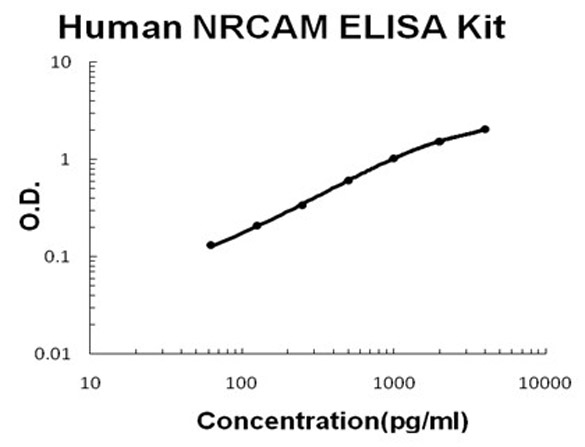Human NRCAM ELISA Kit
KOA0851
1 Kit
ELISA
Human
62.5 pg/ml - 4000 pg/ml
Shipping info:
$50.00 to US & $70.00 to Canada for most products. Final costs are calculated at checkout.
Product Details
Human NRCAM AccuSignal ELISA Kit - KOA0851
Bravo, hBravo, Neuronal cell adhesion molecule, Neuronal surface protein Bravo, Ng CAM related, Ng-CAM-related, NgCAM related cell adhesion molecule, NgCAM-related cell adhesion molecule, Nr CAM, Nr-CAM, Nrcam, NRCAM_HUMAN
ELISA Kit
62.5 pg/ml - 4000 pg/ml
Target Details
NRCAM - View All NRCAM Products
Human
Expression system for standard: NSO; Immunogen sequence: L30-N600
Natural and recombinant human NRCAM. There is no detectable cross-reactivity with other relevant proteins.
Q92823 - UniProtKB
NP_001032209.1 - NCBI Protein
Application Details
ELISA
Useful in Sandwich ELISA for Quantitative Detection of Antigen. Aliquot 0.1ml per well of the 4000pg/ml, 2000pg/ml,1000pg/ml, 500pg/ml, 250pg/ml, 125pg/ml, 62.5pg/ml human NRCAM standard solutions into the precoated 96-well plate. Add 0.1ml of the sample diluent buffer into the control well (Zero well). Add 0.1ml of each properly diluted sample of human cell culture supernates, serum or plasma(heparin, EDTA) to each empty well. It is recommended that each human NRCAM standard solution and each sample be measured in duplicate.
Formulation
Heparin Sodium
Shipping & Handling
Wet Ice
Store vials at 4°C prior to opening. Centrifuge product if not completely clear after standing at room temperature. This product is stable for 6 months at 4°C as an undiluted liquid. Dilute only prior to immediate use. For extended storage freeze at -20°C or below for 12 months. Avoid cycles of freezing and thawing.
See kit insert for complete instructions.
Neuronal cell adhesion molecule is a protein that in humans is encoded by the NRCAM gene. Cell adhesion molecules (CAMs) are members of the immunoglobulin superfamily. This gene encodes a neuronal cell adhesion molecule with multiple immunoglobulin-like C2-type domains and fibronectin type-III domains. This ankyrin-binding protein is involved in neuron-neuron adhesion and promotes directional signaling during axonal cone growth. Also, this gene is expressed in non-neural tissues and may play a general role in cell-cell communication via signaling from its intracellular domain to the actin cytoskeleton during directional cell migration. Allelic variants of this gene have been associated with autism and addiction vulnerability. Alternative splicing results in multiple transcript variants encoding different isoforms.
This product is for research use only and is not intended for therapeutic or diagnostic applications. Please contact a technical service representative for more information. All products of animal origin manufactured by Rockland Immunochemicals are derived from starting materials of North American origin. Collection was performed in United States Department of Agriculture (USDA) inspected facilities and all materials have been inspected and certified to be free of disease and suitable for exportation. All properties listed are typical characteristics and are not specifications. All suggestions and data are offered in good faith but without guarantee as conditions and methods of use of our products are beyond our control. All claims must be made within 30 days following the date of delivery. The prospective user must determine the suitability of our materials before adopting them on a commercial scale. Suggested uses of our products are not recommendations to use our products in violation of any patent or as a license under any patent of Rockland Immunochemicals, Inc. If you require a commercial license to use this material and do not have one, then return this material, unopened to: Rockland Inc., P.O. BOX 5199, Limerick, Pennsylvania, USA.

